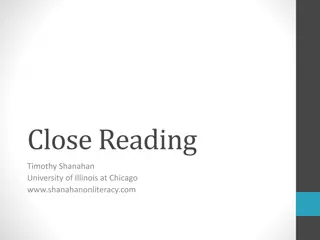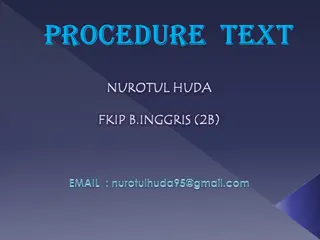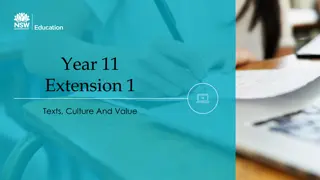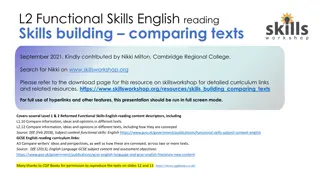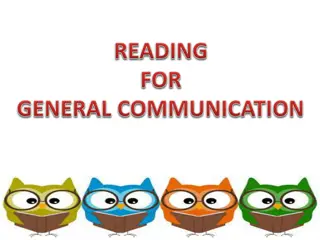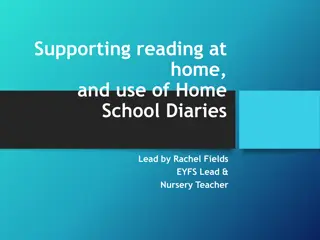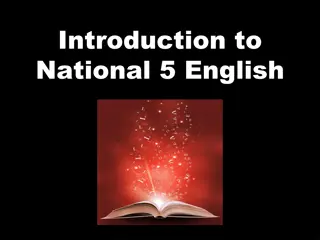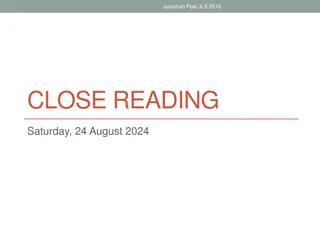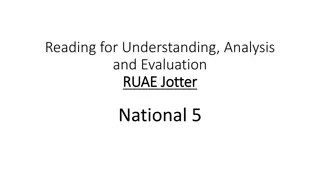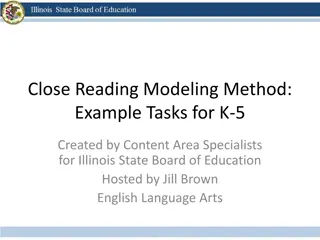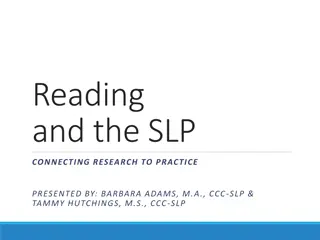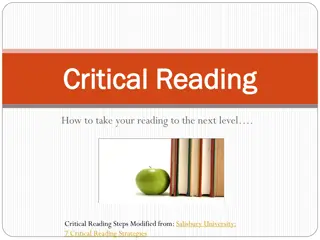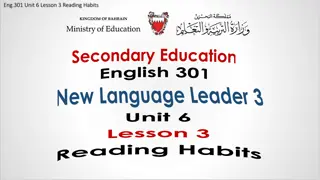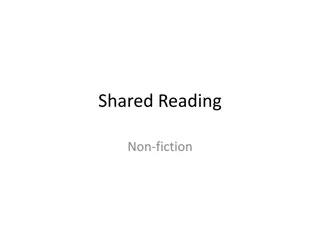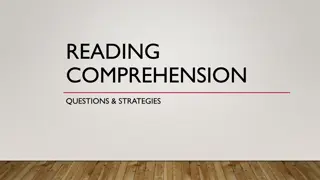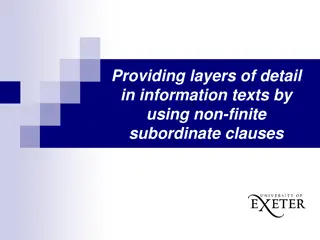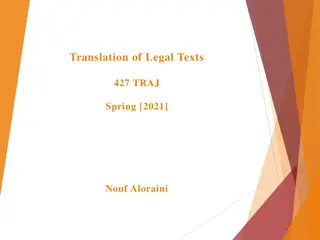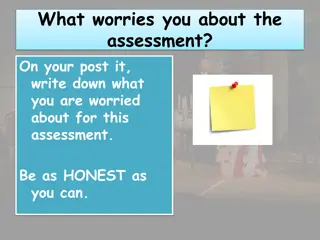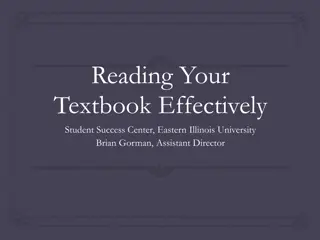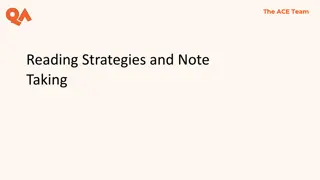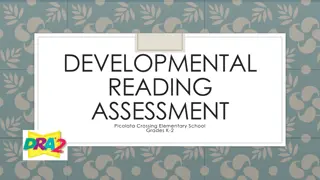Mastering Close Reading: Understanding, Analyzing, and Evaluating Texts
Learn how to excel in close reading by effectively explaining key points from passages using your own words, as demonstrated through detailed examples and practical strategies. Enhance your reading comprehension skills to succeed in National 5 exams and beyond.
Download Presentation

Please find below an Image/Link to download the presentation.
The content on the website is provided AS IS for your information and personal use only. It may not be sold, licensed, or shared on other websites without obtaining consent from the author. Download presentation by click this link. If you encounter any issues during the download, it is possible that the publisher has removed the file from their server.
E N D
Presentation Transcript
NATIONAL 5 CLOSE READING or How I Learned to Stop Worrying and Love Reading for Understanding, Analysis & Evaluation
THE BASICS You should answer using bullet points You must read the question carefully Unless told to quote you should always answer in your own words
INYOUROWNWORDS One of the most common close reading questions asks you to explain a point made in the passage in your own words. Half the marks in the National 5 example paper are for this kind of question.
INYOUROWNWORDS One bullet point per mark Use your own words as far as you possibly can Quoting will get you ZERO marks
Example This may be an urban myth. It matters not. A fairy tale s power lies in its ability to express authentic fears and this one reveals the paranoia that now prevails where bringing up children is concerned. Question: It matters not (line 32)Explain in your own words why the writer believes it is not important whether this story is true or not. 2 Answer: 2 Marks for: - the impact of such a story comes from the way it can express real worries. - this story exposes the ridiculous fears about raising kids. An answer which copies from the passage would score 0.
Using Your Own Words questions - Strategy 1 Identify the relevant part of the passage. 2 Translate each part in your own words. 3 Write your answer. You are going to complete some sample in your own words questions
Now answer the following questions: 1 Before falling asleep she asked even implored me not to say a word to anyone, even her mother, about her sleep-walking adventure. I hesitated at first to promise; but on thinking on the state of her mother s health and how the knowledge of such a thing would fret her, and thinking, too of how such a story might become distorted nay infallibly would in case it should leak out I thought it wiser to do so. I hope I did right. In your own words, explain why the narrator agreed not to tell anyone about her sleep-walking adventure . Dracula
Now answer the following questions: 1 Before falling asleep she asked even implored me not to say a word to anyone, even her mother, about her sleep-walking adventure. I hesitated at first to promise; but on thinking on the state of her mother s health and how the knowledge of such a thing would fret her, and thinking, too of how such a story might become distorted nay infallibly would in case it should leak out I thought it wiser to do so. I hope I did right. In your own words, explain why the narrator agreed not to tell anyone about her sleep-walking adventure . Dracula state of her mother s health the knowledge of such a thing would fret her how such a story might become distorted Her mother had been ill She would worry about it if she knew The facts might become twisted / inaccurate
2 The manager came forward, eyeing the travellers with a mixture of fear and curiosity. Explain, in your own words, how the manager reacted to the travellers.
2 The manager came forward, eyeing the travellers with a mixture of fear and curiosity. Explain, in your own words, how the manager reacted to the travellers. eyeing the travellers with a mixture of fear and curiosity. He was partly scared of them and partly nosy about them
3 He beamed on us with his beautiful smile; he held out a hand to my aunt; and a hand to me. I was too deeply affected by his noble conduct to speak. In your own words, explain what the narrator thought of the gentleman s conduct . The Moonstone
3 He beamed on us with his beautiful smile; he held out a hand to my aunt; and a hand to me. I was too deeply affected by his noble conduct to speak. In your own words, explain what the narrator thought of the gentleman s conduct . The Moonstone his noble conduct His behaviour was courteous / gracious / gentlemanly
Now complete the practice in your own words questions in your booklet.
QUESTION 1 People think that the written language seen on mobile phone screens is new and alien, but all the popular beliefs about texting are wrong. Its distinctiveness is not a new phenomenon, nor is its use restricted to the young. There is increasing evidence that it helps rather than hinders literacy. Texting has added a new dimension to language use, but its long-term impact is negligible. It is not a disaster. Question The writer tells us that all the popular beliefs about texting are wrong . Look at the remainder of the paragraph, and then explain in your own words what two of these popular beliefs are.2 Its uniqueness is a new occurrence It is only teenagers that do it It damages linguistic skills
QUESTION 2 The BBC is a massive sponsor, uniquely independent through its licence fee and the guardian of public service broadcasting. But, as the fight for the control of communications hots up, friends of the BBC both inside and out are alarmed that all this is in jeopardy: the BBC has become too much of a self-seeking institution, too preoccupied with its ratings at the expense of good broadcasting, and unwisely over-extended financially. Question What are the three reasons for causing alarm to friends of the BBC? Use your own words as far as possible. 3 It is too interested in looking after its own interests It is more concerned with quantity of viewers than quality of programmes It is spending money it doesn t have
QUESTION 3 Rowling is loved for her stories, but also for her story. A contemporary Cinderella, she endured the cold flat and life on single-parent benefit. Then Harry happened and she went to the ball. Neil Murray, her husband, might be abashed to find himself cast as Prince Charming, but her life has changed as much as any scullery-maid turned princess. Question Look at lines 15 18. In your own words, explain what comparisons the writer draws between JK Rowling and Cinderella. 4 Both endured cold living conditions Both were on their own/single Both were poor Both found husbands Both had their lives altered for the better (any 4 of the above)
CONTEXT QUESTIONS Essentially these questions are intended simply to test your ability to work out what a word might mean from the context in which you find it. Use the following formula: ___________ means ____________ The word/words _______________ helped me understand this because it / they suggest(s) _____________________
Example It appears to me undeniable that a people has its individual character, its peculiar capacity for trust and suspicion, kindness or cruelty, energy or lassitude. Question How does the context in which it is used help you to understand the meaning of lassitude ?2 Answer Lassitude means tiredness or exhaustion The words trust and suspicion and kindness or cruelty help me understand this because they are opposites, so lassitude must be the opposite of energy
Now complete the practice context questions in your booklet.
QUESTION 4 For two days the general vacillated. Should he give the order to advance, or should he allow his men to cling to their sturdy line of defence? This hesitation was to prove fateful. Question Give the meaning of the term vacillated and explain how the context helps the reader to arrive at the meaning. 2 Vacillated means that he was indecisive The word hesitation helped me understand this because it suggests that he swithered between two different positions
QUESTION 5 Recently I found myself unimpressed by some visiting American who stunned me with monstrous verbosity, determined to use five words where one would do, bent on calling a canteen an in-plant feeding situation and a spade a primitive earth-breaking implement. Question Show how the context of monstrous verbosity helps you to arrive at its meaning. 2 Monstrous verbosity means to use unnecessarily complex language The words a primitive earth-breaking implement helped me understand this because they suggest that they wouldn t just use a single simple word to describe something
SENTENCE STRUCTURE There is no formula for this type of question, but you should: Know the different types Know the punctuation Be as clear as possible
PUNCTUATION Sym bol , : ; - Name Function These separate phrases and clauses within a sentence. A number of these may well indicate a list. These introduce a quotation or a list, an explanation or elaboration or a summing up. There will often be a balance between the two parts of the sentence it divides. These finish off one part of a sentence. It may be used instead of a conjunction to separate two clauses in a sentence. These mark quotations, direct speech, foreign words or words used in an unusual way. comma colon semi- colon inverted commas dash These can function like a colon. Two of them can mark off a parenthesis.
SENTENCE STRUCTURE Basic punctuation and sentences Punctuation marks are the signposts in the structure of sentences. They guide you when looking at the way sentences are made up. You should be familiar with basic sentence construction, made up of a subject, object and verb, and understand the purpose of using basic punctuation such as commas and full stops.
Simple sentences In the simple sentence He watches DVDs." the subject he carries out an action watches and this is related to the object DVDs : object subject Who/ what ever is doing the action Has something done to it He watches DVDs. A doing or action word verb The sentence starts with a capitalised word and ends with a full stop.
Whenever this simple noun verb object pattern is added to, or is altered, the writer has chosen to create a different effect. Your task is to identify or speculate about the reasons why a sentence is made more complex or why it has been written in a certain way.
More complex sentences Sentences which have more than one clause may require commas to punctuate them. Other punctuation devices you may see in close reading include: the colon : used to introduce an elaboration or explanation of the words that went before it the semi-colon ; used to connect two sentences that are very close in content the question mark ? used to indicate a question or doubt the exclamation mark ! used to indicate surprise brackets ( ) or dashes - contain words marked off from the rest of the sentence for emphasis or as an aside. Also known as parenthesis
VARIATIONSONTHEBASIC Example - Inversion "The dog bit the man" is very similar to "The man bit the dog . In the above example only the order of words is changed but the meaning alters completely because the subject of the sentence has switched places with the object. This technique is known as inversion. Inversion is where the normal expected order of a sentence is turned round for some effect; in this case to create surprise or humour.
The establishing of subject and object in a sentence is one of the basic starting points of language. The subject of the sentence is whoever or whatever is doing the verb. It could be a name, a pronoun (he, she, it, they etc) or a thing. The object of the sentence has something done to it. Understanding the way a sentence has been constructed can help us describe more complex and sophisticated writing.
VERBS, SUBJECTSANDOBJECTS - PRACTICE Copy the following sentences using three different colours to underline the verb, subject and object in each one: 1) 2) 3) 4) 5) 6) 7) 8) 9) 10) The children picked strawberries. Paul gave Suzie some chewing gum. Pete s dog dug a deep hole in the garden. My dad baked a fantastic cake for my birthday. Andy watched tv all night. I failed to complete my homework on time again. Every July we go on holiday to Tenerife. My dad received an email from his long lost brother. Even though it was raining hard, he played football in the park. A huge bridge spanned the lake.
EXAMPLE - PARENTHESIS A simple sentence such as The man waited outside the bank. can be made more complex by adding a bit more information: The man, who had done nothing to create suspicion, waited outside the bank . The writer may give us the extra information to add to our understanding and expectation of what is to come but the additional words do not change the grammar of the sentence. Equally, being told something more about the man does not change the original meaning of the sentence.
This technique can be signalled using commas, brackets or dashes but in each case is called a parenthesis. A phrase in parenthesis is one that is flagged as giving extra information. Your job is to decide why it has been done.
Remember, NAMING the technique in structure questions will not be enough. In the Close Reading exercise you will often be asked why or 'to what extent' a technique is effective. These devices are all signals to what is happening in a sentence or a paragraph. With practice, you will learn to recognise them AND their significance.
SENTENCE STRUCTURE - TEST Read the following extracts and select the best answer to the questions:
SENTENCE STRUCTURE - TEST 1 It has been said that two things are required for happiness: love and work. What is the reason for the colon in this sentence ? a) It breaks the sentence up and makes it more interesting. b) It replaces a full stop and saves having two sentences so that it looks more dramatic and assured. c) It introduces an explanation of what is required for happiness.
SENTENCE STRUCTURE - ANSWERS 1 It has been said that two things are required for happiness: love and work. What is the reason for the colon in this sentence? a) It breaks the sentence up and makes it more interesting. This answer is just too vague. You should refer to features of sentence construction here. b) It replaces a full stop and saves having two sentences so that it looks more dramatic and assured. This answer is just not precise enough, and does not give a reason. c) It introduces an explanation of what is required for happiness. Well done! This is the most common use for a colon.
SENTENCE STRUCTURE - TEST 2. London. Michaelmas Term lately over, and the Lord Chancellor sitting in Lincoln's Inn Hall. Implacable November weather. What features of sentence construction do you notice here? a) He is writing in note form. He has a one-word sentence at the start. It is like a diary entry, rather than continuous writing. He tells you where it happens. b) The first and third sentences have no verbs. The first consists of a single word and the third has three, presumably for dramatic effect. Word order makes you concentrate on the fierce weather because it is placed at the end of a dramatic sentence. c) He puts the name of the place first so we know where it is happening, its exact location. He ends with the time of year, November, because when it was set is just as important as where it is happening. Setting is about both time and place and we get a clear picture of bad, wintry weather. Bleak House, Charles Dickens
SENTENCE STRUCTURE - ANSWERS 2 London. Michaelmas Term lately over, and the Lord Chancellor sitting in Lincoln's Inn Hall. Implacable November weather. Bleak House, Charles Dickens What features of sentence construction do you notice here? a) He is writing in note form. He has a one-word sentence at the start. It is like a diary entry, rather than continuous writing. He tells you where it happens. This is almost true but misses out specific references to sentence construction.
SENTENCE STRUCTURE - ANSWERS 2 London. Michaelmas Term lately over, and the Lord Chancellor sitting in Lincoln's Inn Hall. Implacable November weather. Bleak House, Charles Dickens What features of sentence construction do you notice here? b) The first and third sentences have no verbs. The first consists of a single word and the third has three, presumably for dramatic effect. Word order makes you concentrate on the fierce weather because it is placed at the end of a dramatic sentence. Well done! This answer makes relevant points in a concise way.
SENTENCE STRUCTURE - ANSWERS 2 London. Michaelmas Term lately over, and the Lord Chancellor sitting in Lincoln's Inn Hall. Implacable November weather. Bleak House, Charles Dickens What features of sentence construction do you notice here? c) He puts the name of the place first so we know where it is happening, its exact location. He ends with the time of year, November, because when it was set is just as important as where it is happening. Setting is about both time and place and we get a clear picture of bad, wintry weather. This doesn't answer the question as it only deals with the content and meaning and not the way the sentence is made up.
SENTENCE STRUCTURE - TEST 3 Clearly, advancing in long rows at walking pace was suicidal, but that was the plan. (A description of soldiers attacking at the Somme in 1916) Which is the best description of the structure of this sentence? a) The word order is different. It starts with the adverb 'clearly' and has its main message at the end. b) Putting 'advancing...suicidal' in parenthesis, explains more about the plan. c) The word order is different. This is a periodic sentence with the main verb at the end; 'was the plan.' The writer's opinion is given at the start. Using 'clearly' he expects you to agree with him.
SENTENCE STRUCTURE - ANSWERS 3 Clearly, advancing in long rows at walking pace was suicidal, but that was the plan. (A description of soldiers attacking at the Somme in 1916) Which is the best description of the structure of this sentence? a) The word order is different. It starts with the adverb 'clearly' and has its main message at the end. This answer clearly deals with the sentence construction but does not have as much technical detail as the last answer. b) Putting 'advancing...suicidal' in parenthesis, explains more about the plan. Two commas can indicate a parenthesis, but not here. The phrase enclosed by commas is essential to the grammar of the sentence.
SENTENCE STRUCTURE - ANSWERS 3 Clearly, advancing in long rows at walking pace was suicidal, but that was the plan. (A description of soldiers attacking at the Somme in 1916) Which is the best description of the structure of this sentence? c) The word order is different. This is a periodic sentence with the main verb at the end; 'was the plan.' The writer's opinion is given at the start. Using 'clearly' he expects you to agree with him. Well done! Perhaps the best answer as it has most technical detail.
SENTENCE STRUCTURE - TEST 4 Mornings, of course, always bring a sense of new hope and rejuvenation; aching and frozen though I was, I felt better for the thin air and the slow rising of the sun. Which features of sentence structure are most noticeable? a) Word order is most noticeable; morning is the subject of the writing so it is put at the start. b) The parenthesis 'of course' forces you to agree with what he is saying. It is like an aside remark to the reader. c) The semi-colon separates the two sentences and their related ideas. A general statement is made, then a specific one about that particular morning. d) All three of the above.
SENTENCE STRUCTURE - ANSWERS 4 Mornings, of course, always bring a sense of new hope and rejuvenation; aching and frozen though I was, I felt better for the thin air and the slow rising of the sun. Which features of sentence structure are most noticeable? a) Word order is most noticeable; morning is the subject of the writing so it is put at the start. b) The parenthesis 'of course' forces you to agree with what he is saying. It is like an aside remark to the reader. c) The semi-colon separates the two sentences and their related ideas. A general statement is made, then a specific one about that particular morning. d) Well done! They all are equally important.
SENTENCE STRUCTURE - TEST 5 The Scottish race has been variously and plentifully accused of being dour, mean, venal, sly, narrow, slothful, sluttish, nasty, dirty, immoderately drunken, embarrassingly sentimental, masterfully hypocritical, and a blueprint for disaster when eleven of them are together on a football field. Show how sentence structure helps the writer make the point effectively. a) There is one sentence with a long list of nasty things said about Scots people. b) There is a list of thirteen things said about Scots. It is built up to suggest excess. The writer doesn't like them. c) One sentence has a list of twelve critical things said about the Scots, ending with a joke about Scottish football as an anticlimax.
SENTENCE STRUCTURE - ANSWERS 5 The Scottish race has been variously and plentifully accused of being dour, mean, venal, sly, narrow, slothful, sluttish, nasty, dirty, immoderately drunken, embarrassingly sentimental, masterfully hypocritical, and a blueprint for disaster when eleven of them are together on a football field. Show how sentence structure helps the writer make the point effectively. a) There is one sentence with a long list of nasty things said about Scots people. Good choice but this answer is not as good as the final one. b) There is a list of thirteen things said about Scots. It is built up to suggest excess. The writer doesn't like them. The answer is incorrect at the end as the writer is simply reporting what is said, not agreeing with it!
SENTENCE STRUCTURE - ANSWERS 5 The Scottish race has been variously and plentifully accused of being dour, mean, venal, sly, narrow, slothful, sluttish, nasty, dirty, immoderately drunken, embarrassingly sentimental, masterfully hypocritical, and a blueprint for disaster when eleven of them are together on a football field. Show how sentence structure helps the writer make the point effectively. c) One sentence has a list of twelve critical things said about the Scots, ending with a joke about Scottish football as an anticlimax. Well done! This has more to it than the other answers.
You should learn the following aspects of sentence structure which are in your booklet.
Long and complex / short simple sentences Complex sentences may mimic complex ideas; short sentences have impact Repetition of words or phrases Repeated ideas will be emphasised or spotlighted List Provides detail, complexity, etc. Climax / anticlimax following a list Creates suspense/shows easing of tension Questions / exclamations / commands Achieve a particular tone, e.g. emotive (arousing strong feelings) Sentences without verbs (minor sentences) Create a colloquial (informal) style or build tension Unusual word order, e.g. inversion Alters emphasis; may build tension Sentences with symmetrical pattern of structure but with contrasting (opposite) ideas Provide contrast Parenthesis Adds extra information, comment or clarification


